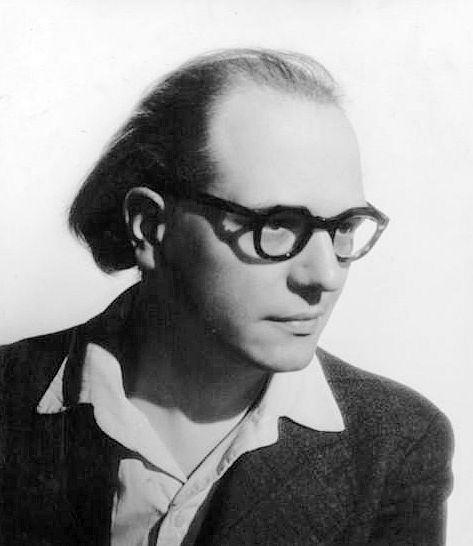
Olivier Messiaen
I will say: I gave these flame these eyes, I have to the ambiguous smile of the moon, to the shine of the ocean, to the silk of the plums, taken away these childish stars, which open up to the endlessness.
Poem of a mother to her unborn son
Family
Olivier Eugène Prosper Charles Messiaen was born on December 10, 1908 in Avignon (North France). His parents had a strong connection to literature. The mother Cecile Sauvage was a poetess. The father Pierre worked as English professor. Since 1919 he was translating over three decades literature from the British author William Shakespeare. That was the reason for Olivier Messiaen´s early interest in Shakespeare´s stories. Messiaen had a younger brother; his name was Alain Messiaen.
Childhood / Youth
In 1912 the family moved to Ambert. During the First World War, Messiaen is especially shaped by his mother, while his father and grandfather were fighting in the war. Another move to Grenoble (South France) in 1914, brought Messiaen to the place, where he achieved the intensest connection to. In this more rural surroundings he roots his interest in nature and for birds.
In the same way there is to notice an uncommon interest for music at the age of eight. The young Olivier Messiaen educated himself to play the piano and to compose canons in the octave according to his perception. Soon after he got piano lessons, but he never had a constant teacher. He got early introduced to musical works for the piano written by Ravels (Gaspard de la nuit) and Debussys (Estampes). After his father returned from war, the family was moving to Nantes. Messiaen´s interest in theological literature and the catholic believe bonded another important guideline in his further thoughts and creations. He had also a significant interest in operas of Mozart, Gluck, Berlioz and Wagner. Even before his eleventh birthday, he participated in harmony lessons by Jehan de Gibon. Since 1919 Messiaen, his brother Alain and his parents were living in Paris.
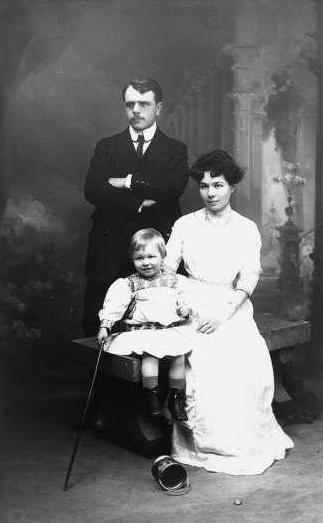
Messiaen with his parents
Training at the conservatory of Paris
Between 1919 and 1930 Messiaen was in training at the famous Parisian conservatory (Conservatoire national supérieur de musique et de danse de Paris). He visited a couple of classes and experienced a strong shaping through the unique style of the conservatory, which was influence by traditions and activities of its teachers.
Now Messiaen got piano lessons from Georges Falkenberg. Jean Gallon was teaching him the doctrines of harmony and laid in this way a cornerstone of chromatic and fioritures, which Messiaen richly used in his music. His efforts and skills were often honoured. In 1924 he even got the second place for his studies in harmony. At his studies of fugues, taught by George Caussade, he got in 1926 the first place for counterpoints and fugues. At lessons for piano accompaniment with Cesar Abel Estyle, Messiaen developed the art of improvisation, which got him in 1927 again the first price. Thanks to his excellent skill of improvisation, he was finally send to Marcel Dupré´s organ lessons. Dupré became one of the most important teachers for Messiaen. Another one was Maurice Emmanuel, how was his teacher for music history. Emmanuel strongly shaped Messiaen while teaching about old-Greek music and metric, as well as the practice of harmonizing Gregorian melodies. In 1929 he received a double first place in organ-playing and organ-improvisation. His last first price obtained Messiaen in Paul Dukas composition class in 1930. Shortly after he left the conservatory with an additional diploma for higher musical studies. Dukas encouraged Messiaens interest in birds and their songs. Furthermore he toke lesson with Noël Gallon (piano, harmony lessons, fugues, counterpoint, orchestration) and Joseph Baggers (drums).
His never ending interest in art and culture even outside of the conservatory was promoted by his parents. On top of that was Olivier Messiaen a convinced catholic.

Composition class, Paul Dukas, 1929
Organist and Composer
Messiaen assumed between 1931 and 1939 the position of the organist in the La Trinité church in Paris. His main task was to liturgical accompany the service, where he had limited possibilities to improvise. During this time he originated ”Messe de la Pentecôte”, which was declined by church for its modernity and ethereal reverie and also most of the older works for the organ by Messiaen. In 1932 he married the composer and violinist Claire Delbos. The group “Jeune France” with the composers André Jolivet, Yves Baudrier and Jean-Yves Daniel-Lesur came together in 1936. Messiaen was active in this musical group too. In 1937, five years after the wedding, his first son, Pascal Messiaen, was born.
At this time Messiaen started his educational activities as a teacher at the Parisian Schola Cantorum, where he taught organ improvisation. On the other hand he taught sight-reading at the École Normale de Musique de Paris.
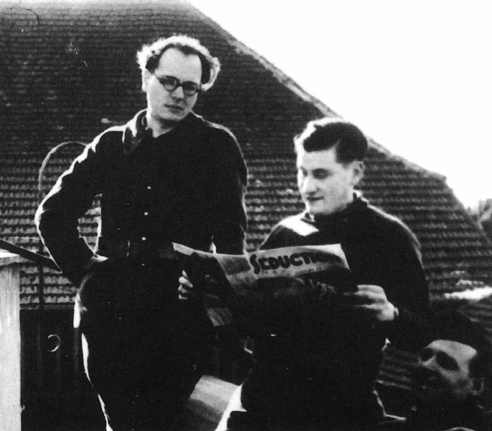
Messiaen’s military service
Military Service / war captivity
With the beginning of the second World War Messiaen was likewise other man conscript to serve for their country. Since he did not had a military training, he became a soldier in the Zitadelle Vauban near Verduns. On the 20th of June in 1940 his onside security force got without a fight into war captivity. First the men had to walk under guard to Nancy, where the were loaded into transportation trains.
On the way Messiaen got to know his boss and lance corporal Etienne Pasquier, who was a solo-cellist, and Henri Akoka, how played the clarinet. After a three day journey with the train, they arrived in the city of Görlitz. There at the prisoners of war camp Stalag VIII A Görlitz-Moys, Messiaen received the prisoner-of-war-number 35333 and got placed with his comrades into the barrack 19 A. During his captivity he developed the masterpiece “Quatuor pour la Fin du Temps”. The first performance toke place in a bitterly cold and dark night at the 15th of January in 1941 around 6´o´clock in the evening at the theater barrack 27 B.
Messiaen could escape the war captivity in February of 1941. After the breakdown of the Vichy Regimes every french paramedic was allowed to return; as well soldier-musicians had this privilege. The commanders of the camp had the opinion that Messiaen arrived without weapons as soldier-musician at the camp grounds. But since he was not registered as paramedic or soldier-musician, he and his friends had to replicate his identification pass, so he could use the chance offered by the revision. Another benefit for him was also that the directors of the camp were knowing Messiaen as composer and musician. Messiaen returned together with Pasquier to France.
Educational Activities / Compositions
After the 7. May 1941 Messiaen worked as a teacher on the Parisian conservatory. He taught harmony lessons on a really high standard and started since 1943 to offer private analysis classes. Additional to this, he schooled after 1947 analysis, aesthetics and rhythm.
After the dead of his first wife Claire Delbos in 1959, he married again on 1. July 1961 the pianist Yvonne Loriod. Not until 1966 was Messiaen able to teach a composition class. Than he was allowed to and became the title of professor for composition. For himself the class was more a class about superior composition. Together with his students he created exotic, antic and ultramodern music, as well as orchestration and rhythm.
Olivier Messiaen was voted in 1967 to the Institut de France. His only opera was written in 1975-1983, after he got a composition assignment from the intendant of the Parisian opera Rolf Liebermann. The title is Saint François d’Assise. In 1978 Messiaen was ending his educational activity at the conservatory.
Messiaen studied the songs of birds on his travel around the world. He tried to make exact notes about every different song. All together he identified over 700 bird tunes. Furthermore he developed utterly unusual methods to mimic the natural tone most alike with usual instruments.
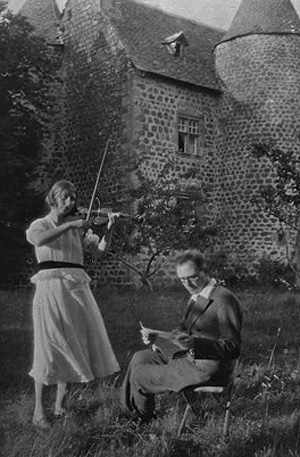
Olivier Messiaen with Claire Delbos, 1933
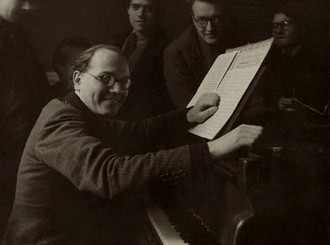
Olivier Messiaen, 1946
Messiaen taught through his years as teacher a couple of important composer of the 20th century; including Pierre Boulez, Alexander Goehr, Jean-Louis Petit, Karlheinz Stockhausen and Iannis Xenakis. Olivier Messiaen died on the 27. April 1992 at a Parisian hospital. He laid to rest at the graveyard Saint Théoffrey.
From 1941 until 1992 accrued over 38 vocal, orchestra, stage, piano and organ music works and pieces of camber music. Olivier Messiaen is today one of the greatest composer; his masterpiece “Quartour pour la fin du temps” one of the most performed works of the 20th century.